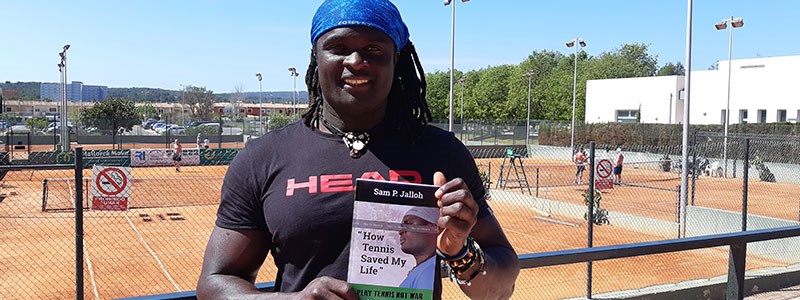
From Sierra Leone to Liverpool – the incredible story of how tennis saved Sam Jalloh’s life
• 10 MINUTE READ
Those who play tennis know just how much of an impact it can have on physical and mental health and wellbeing. In that respect, tennis has changed millions of lives across the world, but you may never have heard of the sport being responsible for saving one, until now...
As we head towards the end of what has been a challenging year for the world, we spoke to Sam Jalloh to bring you his inspirational story of how, after seeing his best friend killed in front of him, it was tennis that gave him a way out to escape a civil way that had enveloped his country. Sam has since written a book titled ‘How Tennis Saved My Life’, and this is his remarkable account of a journey that saw him first start playing using just his hands and led to him now travelling the world as a tennis coach.
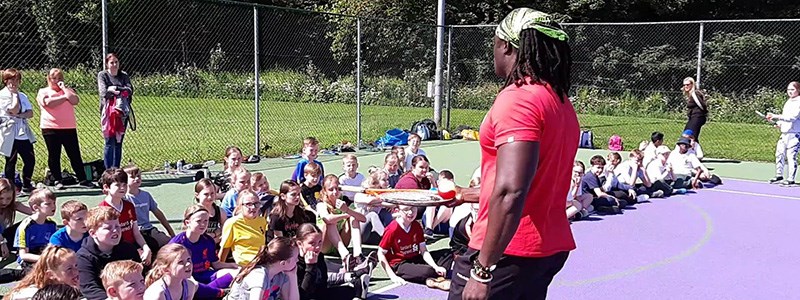
Thirty-eight-year-old tennis coach Sam Jalloh now lives in Southport, but he grew up in a very different world in Freetown, Sierra Leone. He was the first boy in his family to celebrate his second birthday, unlike his three brothers born before him. His father had two jobs, his mother had four, and he had to survive his formative years without shoes, and on just one meal a day, sometimes having to eat cat food
Sam’s mum would cut wood in the jungle and the route there would see them walk past a tennis court, so Sam had long been aware of tennis as a sport and recalls thinking as a young boy that it was something that looked beautiful. His dad however said it was not a sport for him and was instead something for wealthy, white people – and indeed that is who Sam would see playing on the court they walked past.
An active child, Sam enjoyed playing a variety of sports, and as a boy he had an ambition to one day gain a Sierra Leone national tracksuit. He was one of the country's most promising young goalkeepers, but despite his dad’s views, tennis was something that Sam was attracted to.
Watch video of how Sam Jalloh escaped the civil war through tennis via the BBC here
His first experience of playing the sport was with his hands as he didn’t have a racket. Wanting to play more, he began using a racket made out of plywood, though he would continue to play barefoot. Having impressed local coaches with his talent, he chose to leave behind the football pitch to focus on the tennis court – something that ultimately proved to be a life-defining decision.
Tennis players who were selected for the Sierra Leone junior national team received US$250 – an amount that could sustain Sam and his family for half a year. It was this then that became an incentive for Sam to defy societal restraints, save loved ones from poverty, and win over the pride of his father.
"My dad said he would cut all my fingers off if I played tennis – he thought it was a sport just for “rich white people” and wanted me to be a doctor and take the right path," Sam reflected. "My parents didn't want us to struggle like they had.
"I'm not money driven, but I wanted to help my family, and that amount of money could feed us all for six months.
"When I was 16, the night before I left to play my first International Tennis Federation junior championship, I went to see my Dad to give him some money. He was lying in his bed and I told him where I was going, and he must have thought I was from another planet – he didn't understand what I was saying.
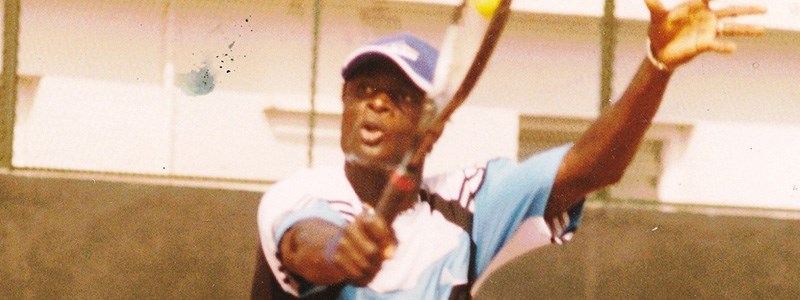
"I explained it to him and gave him a $50 bill. Nobody had ever given him a dollar in his life, and he said 'what kind of money is this?' I said what it was worth, and he flipped out!
"He took it, we laughed, and he prayed for me – that was the first time he was very proud of me."
The next day – 20th December 1998 – he began his international tennis journey through Ghana, Togo and Nigeria. Yet, just one week earlier, he had been facing a significantly different fate that could ultimately have led to him losing his life.
The civil war had broken out when Sam was nine, and would go on for 11 years. During his youth Sam had been captured many times by Nigerian soldiers, brought in to expel rebels from the Sierra Leone city of Freetown but who didn’t know who were rebels and who were not – the rebels had recruited thousands of child soldiers. This time, Sam was out with 11 other youngsters when all the boys were captured – but this time he got lucky.
"He came behind me with his gun and I recognised his voice: 'PJ,' he said, 'You have to run; you have to go.' He put his own life at risk; I never knew what happened to him."
"Fortunately for me, one of the soldiers, Julius, was known to me and he let me go. I had befriended Julius when the Nigerian troops first came [to the city] and we had played tennis together.
"He started training with me in tennis, and also taekwondo – I was a black belt, and he did taekwondo as part of his military training. I knew I was safe with him.
"I didn't recognise him at the time because they all had helmets with black glass on their heads, and they didn't speak much either, they would just use their gun to hit you and direct you where to go.
"He came behind me with his gun and I recognised his voice: 'PJ,' he said, 'You have to run; you have to go.' He put his own life at risk; I never knew what happened to him."
The friendship formed through tennis helped him escape 21 days imprisonment without food, water or a bath – the ordeal that his 11 other colleagues endured.
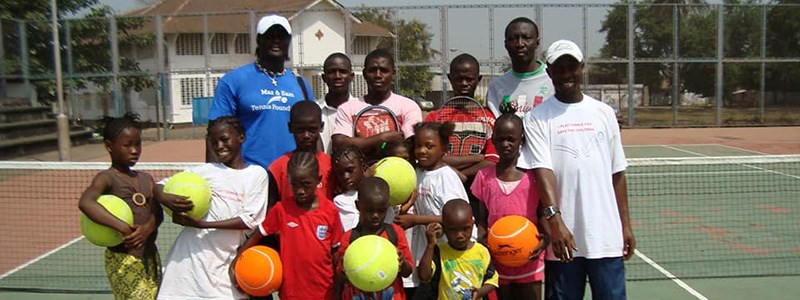
His ITF commitments allowed him to also escape the problems of the country, and when he did return, as a 17-year-old in February 1999, Sierra Leone was not the same place.
"My friends were released on 6 January 1999, and on that day, I was in Togo playing against a guy from Israel," Sam said. "His name was Omar. I'll never forget that.
"I was playing, looking at my coach for help, but he wasn't saying anything. He had a little radio in his ear, listening to the news. Then he just burst into tears and said, 'Everyone in the city of Freetown has died; I've lost my wife and family.'
"When my coach was saying that, I couldn't focus, and I lost that match very badly. Back then, my Dad never owned anything electric other than a radio he had before I was born, and it took him two hours just to tune it, so I couldn't ring my parents. I was the only one who didn't know where my family was, and it was difficult to sleep.
"Everyone in Africa knew what was happening in Sierra Leone, and when we went on court all the players came together to form a circle around us, giving us hugs. Some of the players were in tears, saying, 'we are here for you,' and 'your family will be okay.' The ITF staff kept us going."
Within weeks, rebels had destroyed Freetown, killing tens of thousands of people; Sam could well have been one of the victims of the atrocity had he not been away playing tennis.
After finishing with the ITF tournament in Nigeria, Sam and his coach were refugees in Ghana and could not return to Sierra Leone for seven weeks, until they were able to fly to Guinea and get a small propeller plane back home.
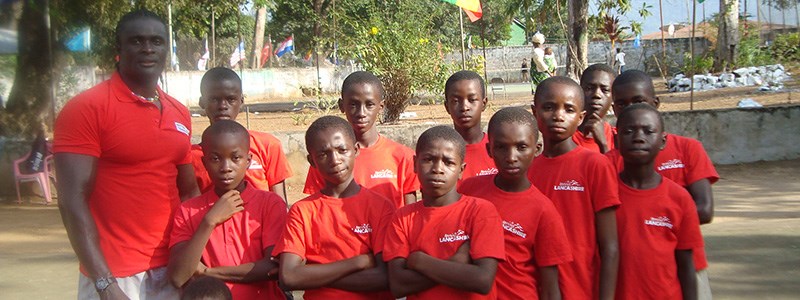
Sam is now a lifetime away from his childhood in West Africa – having spent a lot of his time delivering tennis and inspiring young people in the Liverpool area after completing his LTA coaching qualifications and going on to become head coach at Rainford Tennis Club and Sphynx Tennis Club in Southport. He then began touring internationally with players but whenever he got the chance ‘Coach Sam’ could still be found on the tennis courts of the North West encouraging more children to pick up a racket and help them learn to play tennis.
“It was fun helping to promote tennis in the Liverpool area. We would set up a mini tennis court wherever we could and just get games going using a sponge ball. It's all about getting the children into tennis. So many parents and kids get a feel for the sport and end up saying they will go and find their nearest tennis court. That's really satisfying.”
Sam is passionate about passing on his experience to others, in particular to the younger generations, and believes tennis can be a sport for anyone. More recently, alongside touring the world with professional players he is doing all he can to continue to give back to the sport, having set up a foundation designed to give sporting opportunities to underprivileged children and to coaches in African countries, in particular, giving them the chance to play tennis. He is also working on a new programme he hopes will deliver motivational speaking in schools, universities and sports academies to help bring some hope and sense of direction to young future generation leaders of Africa and the world beyond.
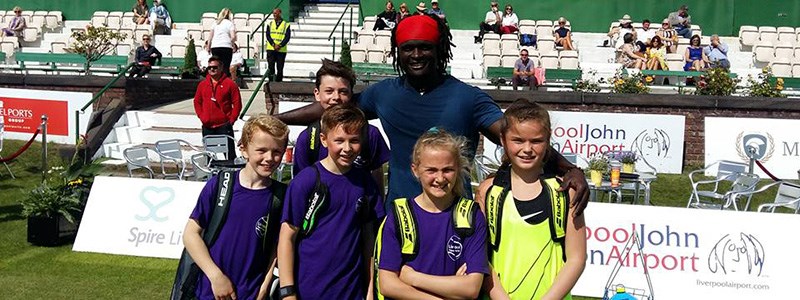
Away from the court, Sam has also spent time writing and promoting his autobiography: ‘How Tennis Saved My Life’, with the ambition of sharing his message that tennis can be for anyone. Whatever he is doing though, Sam never fails to appreciate the value of the sport he adores.
"Every day, we hear bad news in Europe, Africa, America, everywhere. But on the tennis court, I've never seen rude kids or children with weapons or drugs.
"Tennis courts are always a safe haven for anyone, and it's a game you can play until you are 90 years old. People experience all sorts of challenges every day – there are so many other things which affect our lives, but when you pick up a racket and start hitting a ball, you forget about your troubles.
"It keeps your body in good shape and your mind in good spirit – the feeling that you belong to something. You make new friends and good friends, so tennis is a great platform for everyday life.
"There are so many positive things that tennis has done for me, I’m just so pleased to now be able to give back to the sport through coaching."
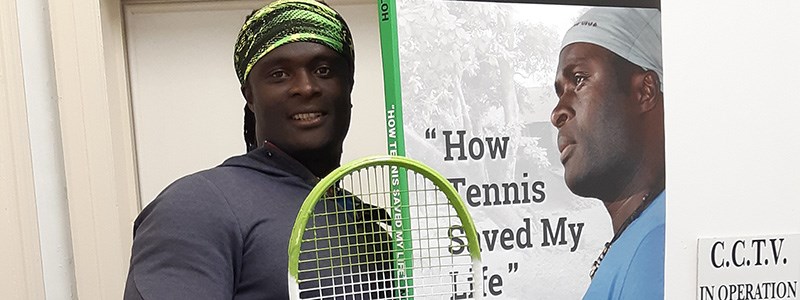
You can find out more about Sam’s remarkable story and his new book here.
Sam was recently named as one of the winners of the 2020 BBC Inspirtations Awards.
BBC Inspirations is an award that honours inspirational people and unsung heroes from all across the world. It is a biennial event run by Outlook, the BBC World Service’s flagship radio programme which specialises in telling extraordinary personal stories.
If you are inspired by Sam’s story and want to follow in his footsteps in becoming a coach and inspiring the next generation of players, find out how the LTA can help you take your first steps on your coaching journey at https://www.lta.org.uk/workforce-venues/coach-teach/





